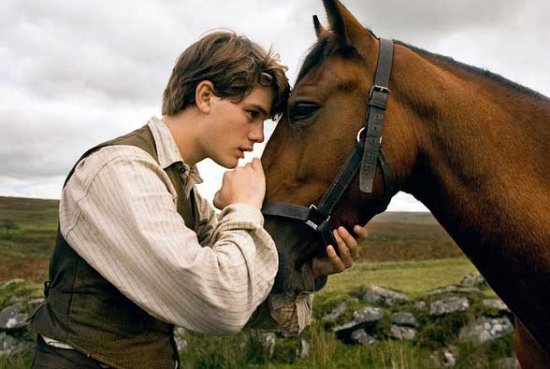
【电影简介】
当第一次世界大战刚刚露出即将打响的苗头的时候,作为一个英国的牧场家庭,尽管他们手头根本就没有足够的资金去拥有它,可他们还是在一场拍卖会上买下了一匹脾气相当狂躁的小马驹,起名为“乔伊”,这匹马看起来就好似是一个不折不扣的失败的选择,泰德(彼得·穆兰 饰)和罗茜·纳拉科特(艾米丽·沃森 饰)夫妇对此都感到非常地失望,他们甚至预感到,挽救濒临倒闭的牧场的愿望就要落空。
但是他们的儿子阿尔伯特(杰瑞米·艾文 饰)却决定驯服“乔伊”,因为他已经被这匹马奔跑的速度、张扬的个性和迷人的灵魂给彻底地征服了——很快,一人一马就变得形影不离起来,然而随着战争的爆发,他们却被迫分开了,“乔伊”就在阿尔伯特的眼皮底下被卖掉了,成为了一位英勇的英国骑兵军官的坐骑,就此走上前线。
可是,离开了阿尔伯特之后,属于“乔伊”的有如迷宫一样的旅程也随之展开,而它在这个过程中经历的分别是快乐、悲伤、艰难与奇迹,并且伴随着这些征程迅速地成长起来,从一只单纯的坐骑,变成了一位非凡的英雄,用它纯真无害的天性、不带任何杂质的动机以及对自己的人类朋友无条件的奉献,感动了来自于这场战争的所有对立面的生命——它不仅拉得动战场上的战地流动医院、还知道灵巧地躲避德国士兵的追赶、同时还在这个过程中点亮了一位法国女孩的想象力、甚至拉着巨大且沉重的大炮爬上了山顶,在阿尔伯特一路不断地靠近属于他自己的危险任务的时候,“乔伊”发现自己在英军和德军之间的“无人地带”遭到了诱捕,即使这一次看起来没有任何逃脱的可能性了,可是它还是抓住了和平时期转瞬即逝的机会,飞奔进回归和重逢的梦想当中。
【音频文本】
The weirdest thing happened when I watched the War Horse. Towards the end of the movie, I heard gentle sobbing and thought it must be some young girl with a heart of gold. I was surprised to find that the cries actually came from a man whose hair had turned a touch of grey. I became even more confused when I noticed tears on the face of another middle-aged man sitting beside me, shimmering in the light from the cinema screen. He too was weeping at Steven Spielberg's latest creation.
I could not understand what these men felt. I have personally never put up so much of an effort to wave off a director's call for my sympathy. Not being an animal lover obviously helped, but there is so much about the film that was a turn off for me.
The first thing to note is what appears to be the director's obsession with war films and the grand topic of humanity. Certainly, wars films are very suitable ground for a discussion on humanity. But if I had created Schindler's List and Saving Private Ryan, I wouldn't consider making another war film, regardless of how novel the narrative. But Spielberg did it, and rather awkwardly so, as his exploration on war goes no further than a reiteration of the sentence: the war has taken everything from every man.
The unconvincing story also added fuel to my fire. The scene where the young lad and his thoroughbred pet horse plough the stony hillside of the British countryside is spiritually elevating, but this scene also alerted me to Spielberg's manipulative style. After this point, I remained unaffected by the storyline and was only capable of uttering a few sighs of incredulity as the horse survives the atrocities of World War I only to be reunited with its master.
Perhaps I shouldn't blame the director, or the screen writers Richard Curtis and Lee Hall. When you adapt a children's novel into a more realistic form, there is bound to be some issues regarding credibility. Butthe way in which the movie is presented also causes a certain amount of discomfort. The unrealistic lighting, so uncharacteristic of Spielberg's usual style, made it hard for viewers to truly engage with the story.
Horse trainer Bobby Lovgren, among others, deserves credit as the horses in this film totally outshone thehuman characters. However, the scene in which soldiers venture into no-man's land to cut the horse loose from barbed wire is interesting enough to deserve applause.
In general, the film is a failure of emotion, cinematography and philosophy. Despite the creative attempt to lead the narrative with a horse, Steven Spielberg did not break any new ground in his latest war film experiment. On a scale from one to ten, I give this movie a five.
轻松调频EZFM 微信mrweekly











